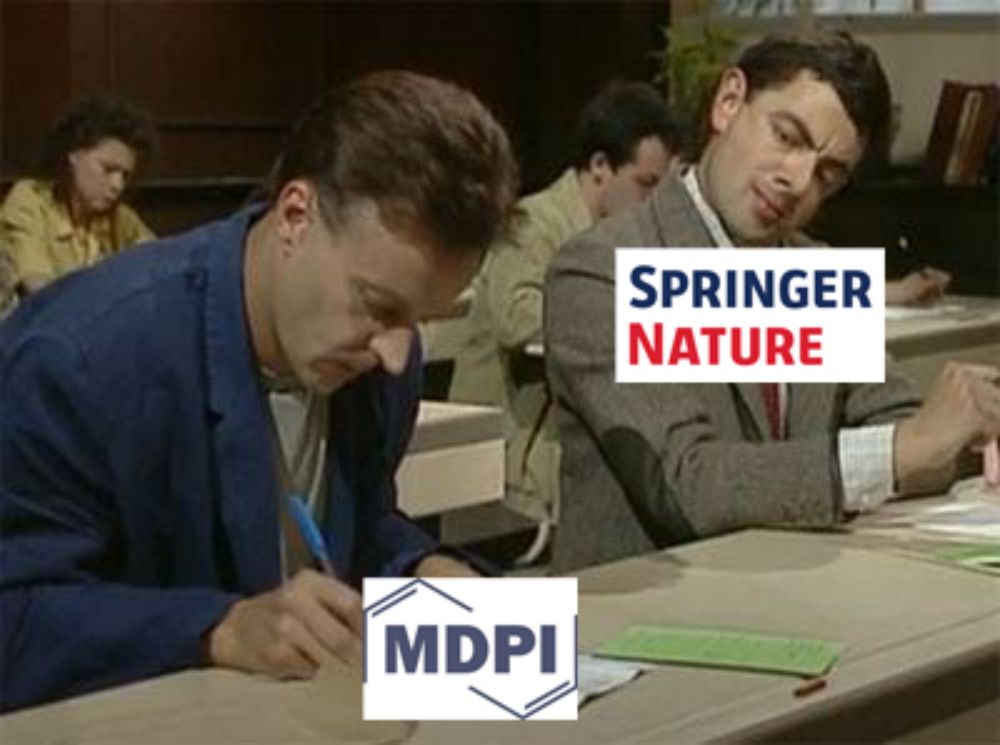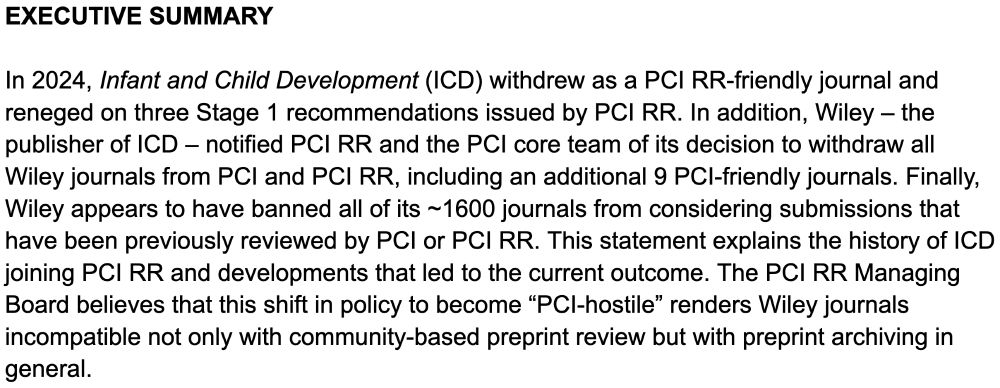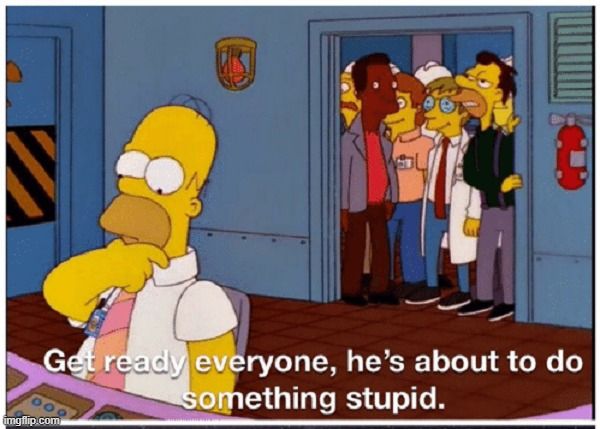In honor of spooky month, share a 4 word horror story that only someone in your profession would understand:
Archives banned making copies.
Archives banned making copies.
Had missed this absolutely brilliant paper. They take a widely used social media addiction scale & replace 'social media' with 'friends'. The resulting scale has great psychometric properties & 69% of people have friend addictions.
link.springer.com/article/10.3...
link.springer.com/article/10.3...

Development of an Offline-Friend Addiction Questionnaire (O-FAQ): Are most people really social addicts? - Behavior Research Methods
A growing number of self-report measures aim to define interactions with social media in a pathological behavior framework, often using terminology focused on identifying those who are ‘addicted’ to engaging with others online. Specifically, measures of ‘social media addiction’ focus on motivations for online social information seeking, which could relate to motivations for offline social information seeking. However, it could be the case that these same measures could reveal a pattern of friend addiction in general. This study develops the Offline-Friend Addiction Questionnaire (O-FAQ) by re-wording items from highly cited pathological social media use scales to reflect “spending time with friends”. Our methodology for validation follows the current literature precedent in the development of social media ‘addiction’ scales. The O-FAQ had a three-factor solution in an exploratory sample of N = 807 and these factors were stable in a 4-week retest (r = .72 to .86) and was validated against personality traits, and risk-taking behavior, in conceptually plausible directions. Using the same polythetic classification techniques as pathological social media use studies, we were able to classify 69% of our sample as addicted to spending time with their friends. The discussion of our satirical research is a critical reflection on the role of measurement and human sociality in social media research. We question the extent to which connecting with others can be considered an ‘addiction’ and discuss issues concerning the validation of new ‘addiction’ measures without relevant medical constructs. Readers should approach our measure with a level of skepticism that should be afforded to current social media addiction measures.
link.springer.com
Quoted in this @HuffPost piece on why disconnection discourse misses the point. www.huffingtonpost.fr/tech-futurs/...

La « digital detox », nouveau symbole hypocrite de la réussite
La détox numérique promet de vous rendre votre liberté et d’améliorer votre santé mentale en vous forçant à stopper le scroll infini. Est-ce trop beau pour être vrai ?
www.huffingtonpost.fr
PhD project: Can young people’s cognitive style explain associations between social media use and mental health? www.findaphd.com/phds/project.... Supervisory Team: Dr Katherine Button, Professor David Ellis, University of Bath, Dr Becky Mars, University of Bristol.

GW4 BioMed2 MRC DTP PhD project: Can young people’s cognitive style explain associations between social media use and mental health? at University of Bath on FindAPhD.com
PhD Project - GW4 BioMed2 MRC DTP PhD project: Can young people’s cognitive style explain associations between social media use and mental health? at University of Bath, listed on FindAPhD.com
www.findaphd.com
PhD project: Can young people’s cognitive style explain associations between social media use and mental health? www.findaphd.com/phds/project.... Supervisory Team: Dr Katherine Button, Professor David Ellis, University of Bath, Dr Becky Mars, University of Bristol.

GW4 BioMed2 MRC DTP PhD project: Can young people’s cognitive style explain associations between social media use and mental health? at University of Bath on FindAPhD.com
PhD Project - GW4 BioMed2 MRC DTP PhD project: Can young people’s cognitive style explain associations between social media use and mental health? at University of Bath, listed on FindAPhD.com
www.findaphd.com
There will also be opportunities to work across our current suite of grants and research centres, including the Centre for Healthcare Innovation and Improvement and the Bath Institute for Digital Security and Behaviour. @idsbbath.bsky.social
We are keen to recruit a researcher with expertise in digital health (i.e., health, psychology, human-computer interaction, human factors, computer science, or a cognate discipline) to primarily support Bath’s contribution to LEAP’s Skills and Knowledge Programme.
Shape the Future of Digital Health Education - join the groundbreaking EPSRC-funded LEAP Hub at the @uniofbath.bsky.social www.bath.ac.uk/jobs/Vacancy...
.
.
KD12987 Research Associate/Research Fellow in Digital Health - Jobs at Bath
Research Associate/Research Fellow in Digital Health - Fixed Term Contract
www.bath.ac.uk
Born out of the challenges we faced when trying to collect data for an empirical study on groups, it was expertly lead by Lukas Mayer and @dessibocheva.bsky.social with Joanne Hinds, Liv Brown and @lukaszpiwek.bsky.social link.springer.com/article/10.3...

Optimeet: A computational tool to enhance participant attendance in group research - Behavior Research Methods
Across disciplines, research often relies on groups of people to participate in experiments or attend events at the same time. Typically, researchers try to maximize attendance by manually identifying...
link.springer.com
'Optimeet: A computational tool to enhance participant attendance in group research' In this paper we discuss the challenges of conducting group based research and provide a practical, web-based tool that can enhance the scheduling and recruitment of groups for experimental research.
See also, the Offline-Friend Addiction Questionnaire (O-FAQ) link.springer.com/article/10.3...

Development of an Offline-Friend Addiction Questionnaire (O-FAQ): Are most people really social addicts? - Behavior Research Methods
A growing number of self-report measures aim to define interactions with social media in a pathological behavior framework, often using terminology focused on identifying those who are ‘addicted’ to e...
link.springer.com
An interesting paper that reminds us that psychometric standards in psychology are often not up to the task. journals.sagepub.com/doi/10.1177/...

Pseudo Effects: How Method Biases Can Produce Spurious Findings About Close Relationships - Samantha Joel, John K. Sakaluk, James J. Kim, Devinder Khera, Helena Yuchen Qin, Sarah C. E. Stanton, 2025
Research on interpersonal relationships frequently relies on accurate self-reporting across various relationship facets (e.g., conflict, trust, appreciation). Y...
journals.sagepub.com
I proudly held my C.Psychol status for exactly one year after my PhD—during which time nobody asked about it, cared about it, or even knew what those letters meant. A friend once described it as a VIP pass to a club that doesn’t exist. www.bps.org.uk/news/bps-pub...

BPS publishes new guidance on the accurate use of professional titles | BPS
The guidance seeks to support members to present their qualifications and expertise correctly and with confidence.
www.bps.org.uk
The term 'Chartered Psychologist' is now legally protected, which will finally put a stop to the rampant epidemic of people pretending to be chartered psychologists at dinner parties.

BPS publishes new guidance on the accurate use of professional titles | BPS
The guidance seeks to support members to present their qualifications and expertise correctly and with confidence.
www.bps.org.uk
We are at the British Science Festival @britsciassoc.bsky.social today in Liverpool (Kazimier Garden - Kaz Garden). Come and say hello if you are about - mega busy tho! britishsciencefestival.org/event/tech-v... with @lukaszpiwek.bsky.social

Another day, another 'Data available on request' request meets the same fate as my childhood letters to the Tooth Fairy. Honestly, it should just read 'Data available on request (terms and conditions apply: must sacrifice first-born child, solve world hunger, and correctly guess my favorite colour).
Reposted by David A. Ellis, Dorothy Bishop
Apple Rumored to Be Developing First Foldable Flip Phone, Set for 2026 Release news.ssbcrack.com/apple-rumore... My thoughts = flip phones provide a bit of nostalgia, but that doesn't guarantee success.

Apple Rumored to Be Developing First Foldable Flip Phone, Set for 2026 Release - SSBCrack News
Back in 2005, the clamshell flip phone epitomized high-tech sophistication, allowing users to end calls with a swift snap. Fast forward to today, two decades
news.ssbcrack.com
@hshawberry.bsky.social, Brown O, Hinds J, Nightingale SJ, @jntowse.bsky.social, Ellis DA. The DECIDE Framework: Describing Ethical Choices in Digital-Behavioral-Data Explorations. Advances in Methods and Practices in Psychological Science. 2025;8(3).
Hopefully this also serves to remind people that ethics is a conversation. Not a tick-box exercise. As digital technologies become increasingly central to how participants and citizens interact with researchers and governments, the stakes for getting this right have never been higher.
Now published, the #DECIDEFramework in #AMPPS. Here we provide a suite of resources to support researchers with ethical considerations in digital behavioural research. journals.sagepub.com/doi/full/10....

Sage Journals: Discover world-class research
Subscription and open access journals from Sage, the world's leading independent academic publisher.
journals.sagepub.com
Reposted by David A. Ellis, Linda Kaye
When should we have discussions about ethics during the research process ? Looking forward to presenting the DECIDE framework today at #Cyber25 @bpscyberpsychology.bsky.social

Better late than never I suppose.
Reposted by David A. Ellis, Dorothy Bishop
by Paolo Crosetto — Reposted by David A. Ellis
True, we are probably expecting too much of publishers.
Also true: publishers went actively in the opposite direction, *mass commissioning* articles with the special-issue model.
MDPI was first, but recently *everyone* is doing it, e.g.
the-strain-on-scientific-publishing.github.io/website/post...
Also true: publishers went actively in the opposite direction, *mass commissioning* articles with the special-issue model.
MDPI was first, but recently *everyone* is doing it, e.g.
the-strain-on-scientific-publishing.github.io/website/post...

Springer Nature Discovers MDPI – The Strain on Scientific Publishing
Home page for the paper ‘The Strain on Scientific Publishing’ by Mark A Hanson, Dan Brockington, Paolo Crosetto and Pablo Gomez Barreiro
the-strain-on-scientific-publishing.github.io
This appears to be a form of de-evolution, or backward evolution.
NEW: Statement from the PCI RR Managing Board on the withdrawal of Infant and Child Development as a PCI RR-friendly journal, and the decision by Wiley to refuse preprints that have been peer-reviewed by @peercommunityin.bsky.social / @pci-regreports.bsky.social
Read here ➡️ osf.io/tn8mh
Read here ➡️ osf.io/tn8mh

These changes don't diminish the contributions of individual researchers. However, it will stop institutions from claiming they had a role in research when, in reality, they had zero involvement.
This often leads to hit-and-miss hiring decisions, and I hope that these changes will encourage an equal consideration of how the institutional environment can best support future research.
Confirmed @ref2029.bsky.social policy: 'Institutions must demonstrate a substantive link to the research output being submitted through an eligible employment relationship.' This will hopefully limit hiring decisions based entirely on 'they have published this thing, so we should hire them for REF'.


